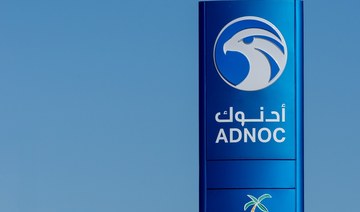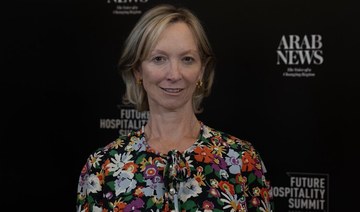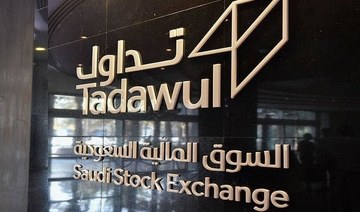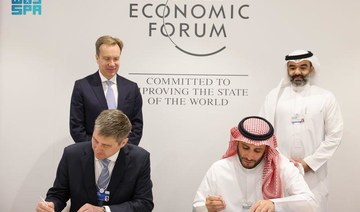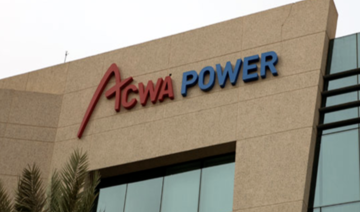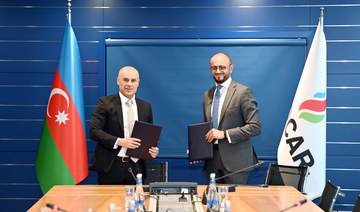RIYADH: JPMorgan & Chase Co. is set to earn more than $100 million on a recent trade tied to the sale of a stake in Saudi Aramco’s oil pipelines, unexpected gains even in the sprawling interest-rate swap market, Bloomberg reported citing people familiar with the matter.
The bank is poised to book gains on a hedging transaction with US investment firm EIG Global Energy Partners, which agreed last month to invest $12.4 billion in the pipelines, the people said.
JPMorgan advised Aramco on the deal and was one of two banks that helped it arrange a loan of more than $10 billion offered to the buyers, the people said.
Given the size of the financing, EIG separately entered into a so-called swap deal with JPMorgan to guard against fluctuations in interest rates.
JPMorgan is on course to reap $100 milion profit after markets moved in its favor, according to the people, who asked not be identified discussing sensitive information.
JPMorgan’s pay day highlights why global banks continue to chase big deals from Aramco, with the expectation of profiting from such ancillary work even if the Saudi energy company itself doesn’t dole out large advisory fees.
EIG is leading a consortium that’s buying a 49 percent interest in leasing rights over Aramco’s oil pipelines, according to an April statement.
JPMorgan eyes $100m pay day on trade linked to Aramco deal
https://arab.news/5h5vk
JPMorgan eyes $100m pay day on trade linked to Aramco deal
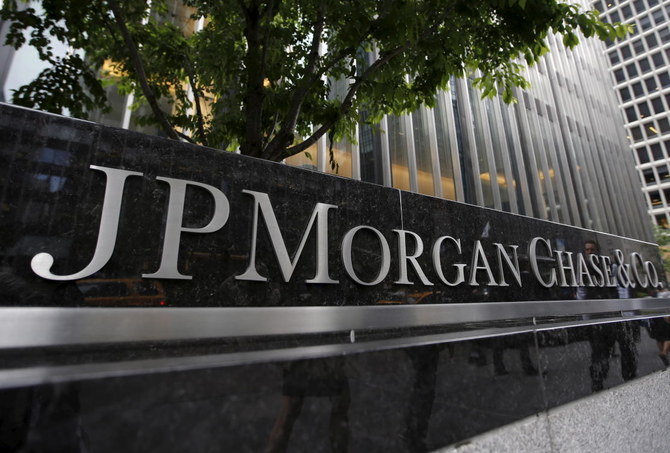
- PMorgan advised Aramco on the deal and was one of two banks that helped it arrange a loan of more than $10 billion
IHG's luxury brand Hotel Indigo set to debut in Al Khobar, expanding Saudi footprint

RIYADH: The Saudi hospitality landscape is poised to welcome a new luxury hotel brand following a management agreement between UK-based IHG Hotels & Resorts and REFAD Real Estate Co.
Signed on the sidelines of the Future Hospitality Summit in Riyadh, the deal will bring the lifestyle brand Hotel Indigo & Residences, featuring 200 keys, to Al Khobar by September 2027.
Supported by the Kingdom’s Tourism Development Fund, the hotel will also include serviced apartments.
Speaking to Arab News, Haitham Mattar, managing director at IHG Hotels & Resorts in India, Middle East and Africa, said: “It’s on the corniche of Al Khobar. It brings authentic, cultural experiences into the hotel, and this is where we found this unique partnership with Refad. Their interest in the brand, also the brand positioning in Saudi Arabia.”
He revealed that the company has so far signed five Hotel Indigo hotels in Saudi Arabia.
The executive also noted that the luxury brand is expanding in the Middle East, following the success of an existing Hotel Indigo in Dubai.
Commenting on the agreement, Mattar said: “This strategic addition not only fuels our growth in Saudi but also reaffirms our commitment to providing exceptional hospitality experiences in key markets.”
He continued: “With the Kingdom having increased its 2030 visitor target from 100 to 150 million, there is a need to bring in lifestyle hotels offering compelling guest experiences that will only further strengthen its robust hospitality sector in line with the goals of Vision 2030.”
Mattar further elaborated on the significant investment and expansion plans for the hotel industry in Saudi Arabia over the next three to five years, including SR2.5 billion ($667 million) to renovate and upgrade existing facilities.
"His Excellency, Ahmed Al-Khateeb, the minister of tourism, has given us a very specific mandate to ensure that we uplift and elevate our hotel product,” he said.
This is to “to ensure that these hotels are well-positioned to receive international travelers, that the ministry and the government are seeking. We have a commitment from our owners to staff that are waiting, especially our Intercontinental brand,” Mattar added.
The managing director said the focus is on the Intercontinental brand, which currently has 10 to 11 hotels in Saudi Arabia and is part of a broader pipeline of 39 new hotels set to open across the region.
“We have a huge concentration of hotels coming up in the Makkah Medinah area, but also we are going into the secondary market. So, for example, Hotel Indigo is also going to Abha, in the Asir region, a very special location as well, in the mountains of Saudi Arabia, and we are also covering new opportunities in Riyadh, Jeddah, as well as Eastern Province,” Mattar explained.
As part of Saudi Arabia’s tourism strategy, which involves developing ten key destinations focusing on a mix of major cities and lesser-known regions, the list of destinations includes Madinah, Riyadh, and several secondary and tertiary markets like the Asir region, Qasim, and Al-Jouf, as well as Jazan, Abha, and Baha.
“This is where, you know, the natural assets of Saudi Arabia are. This is where the future of tourism is going to be. This is where the cultural and historical sites are also placed, and some of the places, as I see it,” Mattar emphasized.
He added that the Ministry of Tourism focuses on exploiting those assets and showcasing them to the world, emphasizing that it’s not just about city escapes in Riyadh and Jeddah, but also about the historical and spiritual offerings in Makkah and Madinah.
Hotel Indigo and Residence will provide guests with a range of dining options, including the Neighborhood Café and Lobby Lounge, as well as an Executive Lounge for a diverse culinary experience.
Business travelers will have access to facilities, including five meeting rooms and a ballroom spanning 290 sq. m., all equipped with the latest technology.
Closing Bell: Saudi main index gains 25 points to close at 12,395

RIYADH: Saudi Arabia’s Tadawul All Share Index continued its upward momentum for the second consecutive day, gaining 25 points to close at 12,394.91.
The total trading turnover of the benchmark index was SR7.47 billion ($1.99 billion) with 187 of the listed stocks advancing and 36 declining.
The Kingdom’s parallel market Nomu also edged up by 0.41 percent to 26,336.28.
However, the MSCI Tadawul Index shed 9.12 points to close at 1,560.69.
Makkah Construction and Development Co. was the best-performing stock of the day with its share price surging by 7.88 percent to SR106.80.
Other top performers on the main market were National Agricultural Development Co. and Saudi Reinsurance Co., whose share prices soared by 7.34 percent and 7.23 percent respectively.
The worst performer on the benchmark index was Saudi Electricity Co., as its share price slipped by 3.72 percent to SR18.62.
On the announcements front, ACWA Power said that shareholders approved the board of directors’ recommendation to distribute a cash dividend of SR0.45 per share for 2023.
Shareholders of the utility developer also green signaled the board’s recommendation to increase capital by SR14.62 million from retained earnings.
On Tuesday, Almunajem Foods Co. said that it signed a share purchase agreement with Balady Poultry Trading Co.
Under the deal, Almunajem Foods Co. will buy a 23 percent stake from Balady Poultry Trading Co.’s shareholders totalling SR181.33 million.
The company, in a Tadawul statement, revealed that the deal will be completed only after obtaining the necessary approvals from the relevant authorities, including the Kingdom\s General Authority for Competition.
Meanwhile, Yamama Cement Co. announced its financial results for the first quarter of this year.
In a Tadawul statement, the cement manufacturer said that its net profit increased by 2.34 percent in the first three months of 2024 to SR115.03 million, compared to the same period of the previous year.
The company attributed the rise in profit to lower cost of sales and higher revenues.
The National Co. for Glass Industries, also known as Zoujaj revealed that its net profit in the first quarter of this year surged by 166.27 percent to SR22.9 million, compared to the same quarter of the preceding year.
Sudan to pursue nuclear energy, exploit gold resources: Energy minister
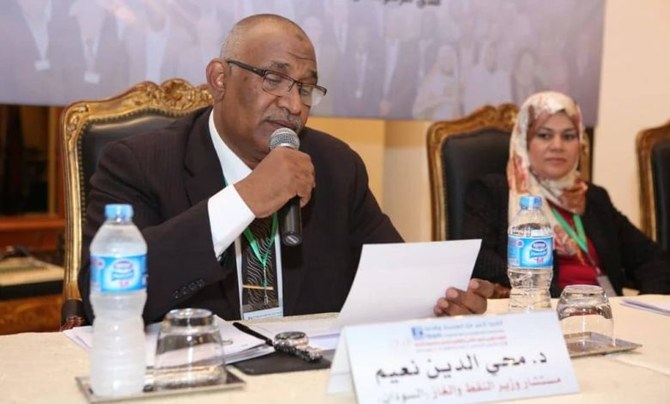
- Energy, mining ministries combined, says official at WEF meeting
- Nuclear power will ‘accelerate’ industrial developmental progress
RIYADH: In a bid to boost the country’s development, Sudan has consolidated its energy and mining ministries, and is pursuing nuclear power as a source of electricity, a senior official said at the World Economic Forum here on Monday.
Speaking to Arab News, Minister of Energy and Petroleum Moheiddin Naeem Mohamed Saeed said the merging of the ministries is aimed at capitalizing on the nation’s gold resources. Pursuing nuclear energy would boost the war-torn country’s development, he added.
“Sudan’s significant gold production will be leveraged to drive development in other sectors,” the minister said.
Meanwhile, Saeed said that he found the discussions on nuclear energy during the WEF event beneficial, adding that his country has begun the process of developing its nuclear-power sector.
“Having completed the initial two steps, it is now high time to seriously consider nuclear energy, given it is safe. This action will accelerate Sudan’s industrial and developmental progress, potentially spearheading reforms in the energy sector, which is a key indicator of a country’s level of development,” Saeed said.
He said that discussions around energy were critical for all nations. “Energy is no longer a private matter; it is a concern that resonates worldwide. Access to energy is a fundamental right for people everywhere. With the evolving quality of life, energy has become indispensable. From household appliances to industrial machinery, our modern way of life relies heavily on energy,” he said.
Saeed added that the WEF special meeting provides a platform for participants to discuss different energy sources and strategies for investing in them optimally, while keeping costs as low as possible, and developing industry standards.
“This forum seeks to unite the global regulations and provide safe and available energy,” he said.
Saeed said Sudan was developing relations with other nations with regard to energy provision. “We have a power interconnection with Ethiopia, and we have a power interconnection with Egypt; they are our neighbors. We have a big goal to achieve in Africa, which is to pursue this interconnection. So, African countries exchange energy,” he said.
He emphasized that Africa, known for its economic challenges, requires collaborative efforts among its nations to address energy issues effectively. “Energy has become an indicator of whether a country is advanced or not, as I previously said. They strive to integrate electricity and energy in general.”
Saeed said that as an oil-producing country, Sudan had undertaken projects with China and Malaysia. “In early 2000, our oil production reached 500,000 bpd (barrels per day), after the country split into two with the establishment of South Sudan, where most of the oil projects were located.
“Our big challenge now is to cooperate with oil old players or the new ones everywhere, as we have no political issues with any country, and this is business. We have a substantial oil reserve in the north,” he said.
He said Sudan has only exploited 20 percent of its known oil reserves for energy, and the government was striving to maximize production due to high demand.
“We currently meet 40 percent of our energy requirements. Additionally, we have initiatives in solar, thermal and wind energy to generate electricity. Moreover, our river systems, supported by numerous dams, contribute to half of Sudan’s power supply, and we are making significant progress in this area.”
On gas, he said Sudan has potential fields in the Red Sea, and are transitioning electricity stations to utilize more of this source.
Saudi minister stresses energy security importance amid climate concerns
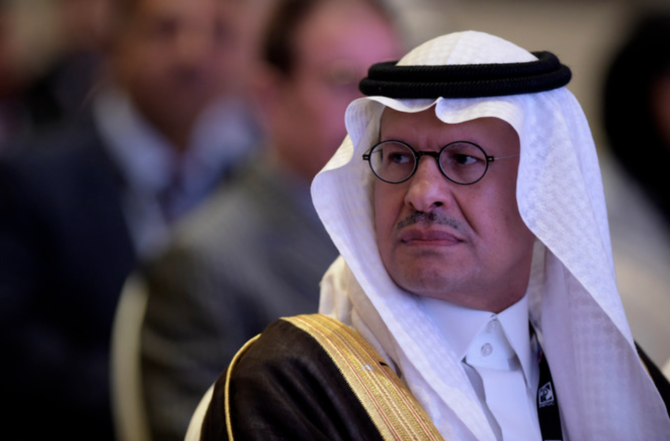
RIYADH: Energy security does not need to be sacrificed to deal with climate concerns, one of Saudi Arabia’s top ministers has insisted.
The Kingdom’s Energy Minister Prince Abdulaziz bin Salman flagged made the comments at a dialogue session titled “Energy Security, Future of Energy, and Sustainable Development” during the 2024 IsDB Group Annual Meetings in Riyadh.
His warning come as climate change discussions now include a focus on innovative solutions such as renewables and advanced technologies while ensuring energy security and economic growth.
Prince Abdulaziz stated: “We believe in the reality of the climate crisis, but we support dealing with it according to the priorities of each country.”
He added: “Our issue is not recognizing the existence of the problem of climate change, but rather how to deal with it in a fair and direct manner, taking into account the differences in the national circumstances of countries.”
The minister stressed the importance of collaboration and collective action, noting Saudi Arabia’s proactive engagement on global warming.
“The Kingdom has the second lowest intensity of carbon dioxide and methane emissions in the world, and countries that occupy lagging positions must follow our approach,” he emphasized, urging nations to unite and work together toward effective solutions.
“The discussion on the issue of climate change must be realistic and logical to enable all parties to cooperate in confronting this global issue,” the minister added.
The energy minister joined a growing chorus of high-profile figures discussing the trade-offs between energy security and climate concerns.
In March, President and CEO of Aramco Amin Nasser called for a new approach to the energy transition that incorporates oil and gas, saying the current strategy “is visibly failing on most fronts.”
Speaking at the same meeting as Prince Abdulaziz in Riyadh, Muhammad Al-Jasser, president of the Islamic Development Bank, highlighted the institution’s commitment to green projects through innovative financing mechanisms.
“Anytime you have a green project, you can issue sukuk against it. Once you have those green sukuks, you can create green assets against it and then you have a virtual cycle triggered into the process and we’re already there,” he explained.
Al-Jasser emphasized the bank’s proactive approach to catalyzing change rather than waiting for it.
“This year is going to be a bumper year for us, we’re going to be issuing $6 billion of sukuk; some of it will be green. This is our way of helping and not waiting too long to bring about that change,” he said.
Addressing the financing challenges associated with the energy transition, he emphasized the progress made by IsDB in increasing funding for sustainable projects.
“We will provide financing within our abilities and we do it with also all of the other Arab lending institutions,” he explained.
He continued: “There’s the Arab Coordination Group, we compare notes and we go out and we finance some of these projects like the hydro dams that we have financed together and that helps a lot with the transition and with the creation of sufficient energy to fuel these economies.”
However, he acknowledged the financial constraints and emphasized that the transition must be realistic and inclusive, stating: “We will never have enough money, and therefore the transition has to take that into account.”
Malaysia to witness $10bn investment from ACWA Power in renewable energy sector: prime minister
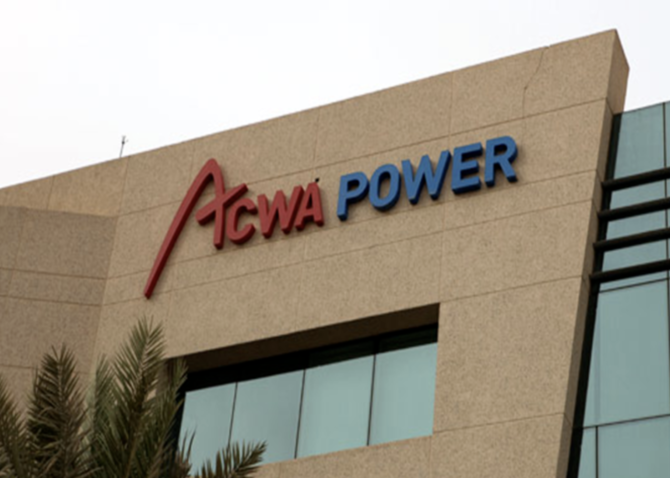
RIYADH: Saudi utility firm ACWA Power has expressed interest in investing $10 billion in Malaysia over the next 10 years to develop renewable energy projects.
According to a report by the Malaysian National News Agency Bernama, ACWA Power will collaborate with Cypark Resources Bhd on the developments.
Malaysian Prime Minister Anwar Ibrahim confirmed this news on his Facebook page following a meeting with ACWA Power Chairman Mohammad Abunayyan on the sidelines of the World Economic Forum in Riyadh.
Ibrahim said that the Saudi firm is prepared to collaborate with strategic partners in Malaysia to develop multiple renewable projects across various states in the nation.
“I express my appreciation for ACWA Power’s commitment to increasing its investments in Malaysia and informing that the country always welcomes any effort that contributes to the economic growth of the country and the prosperity of the people,” Ibrahim wrote on his Facebook page.
He added that ACWA Power has already presented several investment proposals, which include developing renewable sites in Kelantan, Perlis, and Johor, as well as in Terengganu and Sarawak.
The prime minister said Malaysia will continue to implement investment-friendly policies, with a focus on initiatives ensuring that every deal is simplified and expedited.
Earlier this month, ACWA Power signed a new agreement with SOCAR, the state oil company of Azerbaijan, to accelerate the development of renewable projects in the nation.
“The primary directive of the agreement will be to enhance SOCAR’s carbamide fertilizer facility, striving toward more value-added low-carbon products,” said ACWA Power in a statement at that time.
In the same month, the Saudi-listed firm also signed another deal with the International Renewable Energy Agency to accelerate the adoption of clean energy worldwide.
Under the deal, the utility developer will work closely with IRENA to share crucial insights on infrastructure investment in renewable energy, green hydrogen advancement, solar energy, and the intersection of energy and water.
ACWA Power and IRENA will also investigate avenues to mobilize finance and investment for renewable projects, along with supporting infrastructure for the development, storage, distribution, and transmission of clean energy.



